Strictly Personal
Is Anas The Bill Cosby Of Ghana?
There is no doubt that Heath Cliff Huxtable and his family in the sitcom Cosby show made great impressions on our lives over the last couple of decades
Published
6 years agoon
There is no doubt that Heath Cliff Huxtable and his family in the sitcom Cosby show made great impressions on our lives over the last couple of decades. The physician and his attorney wife gave us all the important reasons for making education a priority in life and building a sound character to become good citizens. The spinoff of the show, ‘A different World” also maintained the same ethos where building of refined individuals capable of making wise decisions in a college environment was the theme.
Bill Cosby, the man who play Heath Cliff Huxtable, did a lot of good and I dare say single handedly put a lot of kids through college. The shows were an inspiration to many. Through the show, Bill Cosby made it possible for the average kid, especially the minority to believe that college education and staying on the right side of the law inspires a top middle class and beyond life style. I can credit my own zest and desires for further education to some of the show’s influence.
But the public perception of the man we adored so much, Cliff Huxtable, hid behind a dark side of Bill Cosby. Bill Cosby had all the good intentions to inspire society through comedy, but the demons of his innate character emerged to hunt him. It took another comedian to expose him.
Is Kennedy Agyapong the comedian to expose Anas? Kennedy is a loud mouth politician. He hasn’t got the training in fine language and one is tempted to immediately dismiss him as a braggart. He beats his chest like a gorilla in the forest, the king Kong of Ghana. Recently he has been crying foul, showing his own video of Anas allegedly involved in criminal acts. Is Kennedy Agyapong peeling the surface of something to look deeply into or is he blowing hot air? Not to discount the great work done by Anas, (as in the Cosby Show). The Anas exposĕ is admirable, but is he hiding his own demons?
Is Kwaku Baako standing by his man as Camellia Cosby continues to stand by Bill Cosby even as the courts prove him guilty? 64 women came forward to accuse Bill Cosby of inappropriate behavior, only one was admissible in court, yet, that was enough to convict Bill Cosby. Kennedy claims there are several people allegedly running to him with stories about Anas collecting bribe from them. These allegations should be thoroughly investigated, and even if one is found to be true, Anas should equally face the law. However, if these are found to be false, that, Honorable Kennedy Agyapong and his cronies fraudulently pieced clips together to tarnish the image of Anas, the honorable must be dealt with squarely.
Anas has filed a defamation suit of GHC25 million against Honorable Kennedy Agyapong. The honorable is quoted as saying; “GHC25million, I sit on that shit”. The pronouncements of the MP, Kennedy Agyapong, can often be distasteful. It is alleged that he was such a fine gentleman when he was a taxi driver in New York. Ghana politics must have rubbed him of his finesse. I hope the honorable will take a leaf from what Mrs. Obama said; ‘When they go low, you go high” but no, Kennedy Agyapong will wallow in the mud with his adversaries.
A breakdown in our legal system.
The Anas investigative work has been warranted because of the disregard for law enforcement in our society. The lack of political will on the part of our politicians and the legislature to act. Corruption and some traditional customs have rendered our laws and legal system impotent. As a matter of fact, everything Anas has uncovered hasn’t been a secret. They were and still are well known practices in the country that the institutions and legal apparatus have failed to address.
The entire country knows the Chiefs in Ghana sell land to multiple bidders. This is criminal, but how many Chiefs have been prosecuted, let alone jailed for this crime. How many Chiefs (including Otumfuo) have called a town hall meeting to declare to their people the cedi amount of the number of plots or acres of the township land that have been sold or royalties realized from companies of which the town or village will use for some identified development projects? None, (no accountability!).
Land in most villages and towns are sold as the Chief’s personal property, just as ministers use government coffers as their personal bank accounts. This behavior, big and small is paramount with people in positions of power and in law enforcement in Ghana. The partisan politics of cover ups is what has made necessary such sting operations, undercover investigation and set ups that Anas is using. The average Ghanaian is at a loss, running to churches, rivers and fetish priests looking for answers, all because, the laws in the land do not work to protect them.
Apparently, everything that happens in Ghana is spiritual and one needs to seek a spiritual doctor for directions. The judiciary system is like our hospitals in Ghana, “hit and miss”; one may need to try a few hospitals before finding a bed. And when a bed is found, a doctor may not be available or no diagnostic tools available for the doctor to work with. When one reports a case to the police, in many cases one has to pay for the transportation of the officer to attend to the case.
Read Also: The truth about being African versus dressing African
The bigger picture of this contention between Anas and Honorable Kennedy Agyapong is all because the laws in the land are not enforceable; mostly in conflict with tradition and culture. Kennedy Agyapong, an honorable minister of parliament, a member of the legislative branch, could announce on national television and to the world that he is married but has a girlfriend; proudly confirming that his wife knows he has a girlfriend and its part of Ghana’s tradition. So it is part of Ghana’s tradition to have stool wives.
So it is part of Ghana’s tradition to have stool servants or shrine slaves. So it is part of Ghana’s tradition for some chiefs to adjudicate on some cases. So it is part of Ghana tradition to find an influential elder to get you off the hook even when guilty. So it is part of Ghana’s tradition to send gifts to the Chiefs. In some cases, the Chiefs have aids who arrange for such “gifts’. No wonder even our judges are confused. Some of the judges claimed they acted in the traditional capacity to receive gifts but were not bribed.
Even some journalists (including Captain Smart who claims to fight corruption) gets confused discussing the subject; a gift for ‘influence peddling’ and a bribe. It is wrong and must be punishable to use the office of the state to travel and conduct transactions as if its private business. It is unethical if not criminal to use one’s position in the capacity of public service to receive gifts, solicited or unsolicited in any form with the intent to influence an outcome.
It is time Ghanaians evolve from those traditions that bring shame, turning the country into a bunch of jokers and elevate those elements of our culture that speak to Ghana as a constitutional democratic republic; a country with enforceable laws that govern the land. For this to be realized, Ghanaians must rise from the grassroots to the top; demanding accountability from the Chiefs to the ministers and to the President, call for a change to some of the antiquated traditions and customs that disadvantage the commoner and fly in the face of human rights, else there will be no progress in Ghana.
Commentator…..George Oteng Attakora
You may like
-
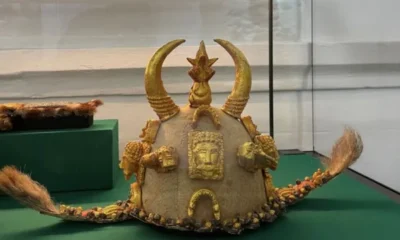

Ghanaians celebrate return of Asante Gold artefacts looted by British
-


African men run away from single mothers— Joselyn Dumas
-


Ghana mourns as top gospel music icon Koda passes away
-
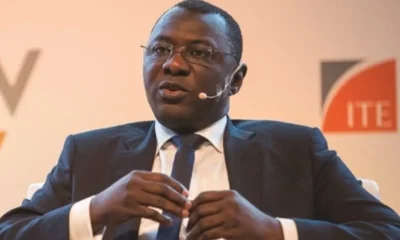

Ghana’s finance minister anticipates debt restructuring MoU with lenders
-
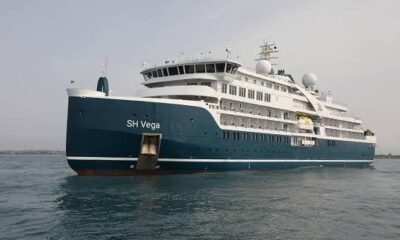

Ghana’s Elmina Fishing Harbour welcomes first-ever cruise liner SH Vega
-
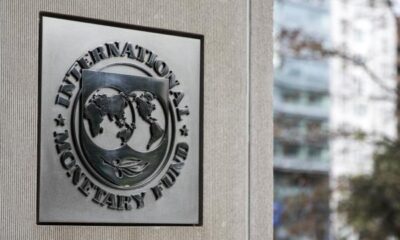

Ghana’s bondholders deal ‘a matter of time’— IMF
Strictly Personal
This Sudan war is too senseless; time we ended it, By Tee Ngugi
Published
6 days agoon
April 28, 2024
Why are the Sudanese Armed Forces (SAF) and the paramilitary Rapid Support Forces (RPF) engaged in a vicious struggle? It is not that they have ideological, religious or cultural differences.
Not that people should fight because of these kinds of differences, but we live in a world where social constructions often lead to war and genocide. It is not that either side is fighting to protect democracy. Both sides were instruments of the rapacious dictatorship of Omar el-Bashir, who was overthrown in 2019.
Both are linked to the massacres in Darfur during Bashir’s rule that led to his indictment by the International Criminal Court for crimes against humanity. They both stood by as ordinary, unarmed people took to the streets and forced the removal of the Bashir regime.
None of these entities now fighting to the last Sudanese citizen has any moral authority or constitutional legitimacy to claim power. They both should have been disbanded or fundamentally reformed after the ouster of Bashir.
The SAF and the RSF are fighting to take over power and resources and continue the repression and plunder of the regime they had supported for so long. And, as you can see from news broadcasts, they are both well-versed in violence and plunder.
Since the fighting began in 2023, both sides have been accused of massacres that have left more than 30,000 people dead. Their fighting has displaced close to 10 million people. Their scramble for power has created Sudan’s worst hunger crisis in decades. Millions of refugees have fled into Chad, Ethiopia and South Sudan.
The three countries are dubious places of refuge. Chad is a poor country because of misrule. It also experiences jihadist violence. Ethiopia is still simmering with tensions after a deadly inter-ethnic war.
And South Sudan has never recovered from a deadly ethnic competition for power and resources. African refugees fleeing to countries from which refugees recently fled or continue to flee sums up Africa’s unending crisis of governance.
Africa will continue to suffer these kinds of power struggles, state failure and breakdown of constitutional order until we take strengthening and depersonalising our institutions as a life and death issue. These institutions anchor constitutional order and democratic process.
Strong independent institutions would ensure the continuity of the constitutional order after the president leaves office. As it is, presidents systematically weaken institutions by putting sycophants and incompetent morons in charge. Thus when he leaves office by way of death, ouster or retirement, there is institutional collapse leading to chaos, power struggles and violence. The African Union pretends crises such as the one in Sudan are unfortunate abnormally. However, they are systemic and predictable. Corrupt dictatorships end in chaos and violence.
Tee Ngugi is a Nairobi-based political commentator.
Strictly Personal
Air Peace, capitalism and national interest, By Dakuku Peterside
Published
3 weeks agoon
April 16, 2024
Nigerian corporate influence and that of the West continue to collide. The rationale is straightforward: whereas corporate activity in Europe and America is part of their larger local and foreign policy engagement, privately owned enterprises in Nigeria or commercial interests are not part of Nigeria’s foreign policy ecosystem, neither is there a strong culture of government support for privately owned enterprises’ expansion locally and internationally.
The relationship between Nigerian businesses and foreign policy is important to the national interest. When backing domestic Nigerian companies to compete on a worldwide scale, the government should see it as a lever to drive foreign policy, and national strategic interest, promote trade, enhance national security considerations, and minimize distortion in the domestic market as the foreign airlines were doing, boost GDP, create employment opportunities, and optimize corporate returns for the firms.
Admitted nations do not always interfere directly in their companies’ business and commercial dealings, and there are always exceptions. I can cite two areas of exception: military sales by companies because of their strategic implications and are, therefore, part of foreign and diplomatic policy and processes. The second is where the products or routes of a company have implications for foreign policy. Air Peace falls into the second category in the Lagos – London route.
Two events demonstrate an emerging trend that, if not checked, will disincentivize Nigerian firms from competing in the global marketplace. There are other notable examples, but I am using these two examples because they are very recent and ongoing, and they are typological representations of the need for Nigerian government backing and support for local companies that are playing in a very competitive international market dominated by big foreign companies whose governments are using all forms of foreign policies and diplomacy to support and sustain.
The first is Air Peace. It is the only Nigerian-owned aviation company playing globally and checkmating the dominance of foreign airlines. The most recent advance is the commencement of flights on the Lagos – London route. In Nigeria, foreign airlines are well-established and accustomed to a lack of rivalry, yet a free-market economy depends on the existence of competition. Nigeria has significantly larger airline profits per passenger than other comparable African nations. Insufficient competition has resulted in high ticket costs and poor service quality. It is precisely this jinx that Air Peace is attempting to break.
On March 30, 2024, Air Peace reciprocated the lopsided Bilateral Air Service Agreement, BASA, between Nigeria and the United Kingdom when the local airline began direct flight operations from Lagos to Gatwick Airport in London. This elicited several reactions from foreign airlines backed by their various sovereigns because of their strategic interest. A critical response is the commencement of a price war. Before the Air Peace entry, the price of international flight tickets on the Lagos-London route had soared to as much as N3.5 million for the economy ticket. However, after Air Peace introduced a return economy class ticket priced at N1.2 million, foreign carriers like British Airways, Virgin Atlantic, and Qatar Airways reduced their fares significantly to remain competitive.
In a price war, there is little the government can do. In an open-market competitive situation such as this, our government must not act in a manner that suggests it is antagonistic to foreign players and competitors. There must be an appearance of a level playing field. However, government owes Air Peace protection against foreign competitors backed by their home governments. This is in the overall interest of the Nigerian consumer of goods and services. Competition history in the airspace works where the Consumer Protection Authority in the host country is active. This is almost absent in Nigeria and it is a reason why foreign airlines have been arbitrary in pricing their tickets. Nigerian consumers are often at the mercy of these foreign firms who lack any vista of patriotism and are more inclined to protect the national interest of their governments and countries.
It would not be too much to expect Nigerian companies playing globally to benefit from the protection of the Nigerian government to limit influence peddling by foreign-owned companies. The success of Air Peace should enable a more competitive and sustainable market, allowing domestic players to grow their network and propel Nigeria to the forefront of international aviation.
The second is Proforce, a Nigerian-owned military hardware manufacturing firm active in Rwanda, Chad, Mali, Ghana, Niger, Burkina Faso, and South Sudan. Despite the growing capacity of Proforce in military hardware manufacturing, Nigeria entered two lopsided arrangements with two UAE firms to supply military equipment worth billions of dollars , respectively. Both deals are backed by the UAE government but executed by UAE firms.
These deals on a more extensive web are not unconnected with UAE’s national strategic interest. In pursuit of its strategic national interest, India is pushing Indian firms to supply military equipment to Nigeria. The Nigerian defence equipment market has seen weaker indigenous competitors driven out due to the combination of local manufacturers’ lack of competitive capacity and government patronage of Asian, European, and US firms in the defence equipment manufacturing sector. This is a misnomer and needs to be corrected.
Not only should our government be the primary customer of this firm if its products meet international standards, but it should also support and protect it from the harsh competitive realities of a challenging but strategic market directly linked to our national military procurement ecosystem. The ability to produce military hardware locally is significant to our defence strategy.
This firm and similar companies playing in this strategic defence area must be considered strategic and have a considerable place in Nigeria’s foreign policy calculations. Protecting Nigeria’s interests is the primary reason for our engagement in global diplomacy. The government must deliberately balance national interest with capacity and competence in military hardware purchases. It will not be too much to ask these foreign firms to partner with local companies so we can embed the technology transfer advantages.
Our government must create an environment that enables our local companies to compete globally and ply their trades in various countries. It should be part of the government’s overall economic, strategic growth agenda to identify areas or sectors in which Nigerian companies have a competitive advantage, especially in the sub-region and across Africa and support the companies in these sectors to advance and grow to dominate in the African region with a view to competing globally. Government support in the form of incentives such as competitive grants ,tax credit for consumers ,low-interest capital, patronage, G2G business, operational support, and diplomatic lobbying, amongst others, will alter the competitive landscape. Governments and key government agencies in the west retain the services of lobbying firms in pursuit of its strategic interest.
Nigerian firms’ competitiveness on a global scale can only be enhanced by the support of the Nigerian government. Foreign policy interests should be a key driver of Nigerian trade agreements. How does the Nigerian government support private companies to grow and compete globally? Is it intentionally mapping out growth areas and creating opportunities for Nigerian firms to maximize their potential? Is the government at the domestic level removing bottlenecks and impediments to private company growth, allowing a level playing field for these companies to compete with international companies?
Why is the government patronising foreign firms against local firms if their products are of similar value? Why are Nigerian consumers left to the hands of international companies in some sectors without the government actively supporting the growth of local firms to compete in those sectors? These questions merit honest answers. Nigerian national interest must be the driving factor for our foreign policies, which must cover the private sector, just as is the case with most developed countries. The new global capitalism is not a product of accident or chance; the government has choreographed and shaped it by using foreign policies to support and protect local firms competing globally. Nigeria must learn to do the same to build a strong economy with more jobs.
EDITOR’S PICK
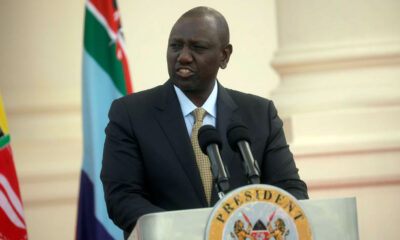

Kenya: President Ruto hints at ‘dire’ weather outlook as Cyclone Hidaya nears
President William Ruto has announced that the severe rains that have been plaguing Kenya for the past several weeks resulting...
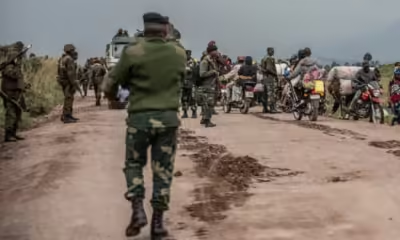

Again, Rwanda denies it attacked displaced persons in DR Congo
For the sixteenth time, Rwanda refuted US charges on Saturday that its troops attacked a camp for internally displaced persons...


Nigeria offers oil majors faster exit if …
Oil-rich West African country, Nigeria, has offered major oil companies, such as Exxon Mobil and Shell, that planned to leave...


Nigeria’s Security Exchange chief to meet foreign, local crypto exchanges, others over crypto regulation
On Monday, local and international cryptocurrency exchanges will meet with Dr. Emomotimi Agama, the recently appointed Director General of the...


Rhino Resources, BP-Eni JV sign agreement for Namibia offshore licence
Rhino Resources Namibia and a BP-Eni joint venture have agreed to share a 42.5% stake in a block located in...
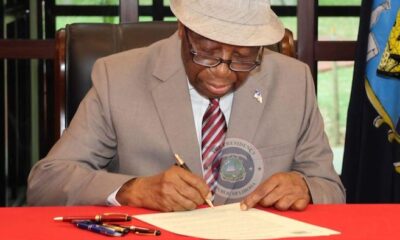

Liberia: President Boakai signs order to create war crimes court
To provide long-overdue justice to those who suffered grave injustices during the two civil wars that raged in Liberia, President...
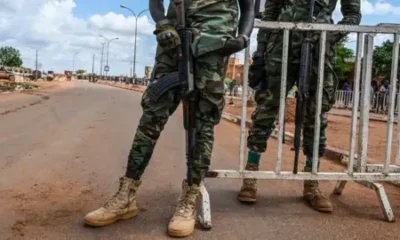

US official accuses Russian troops of entering base housing US military in Niger
According to a senior United States defence official quoted by Reuters, Russian military soldiers have entered an air base in...
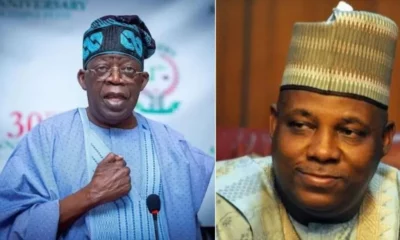

Nigeria’s presidency insists reforms prevented economic collapse
Nigeria’s presidency on Thursday reiterated that the current administration’s economic reforms of the past one year “saved the life of...
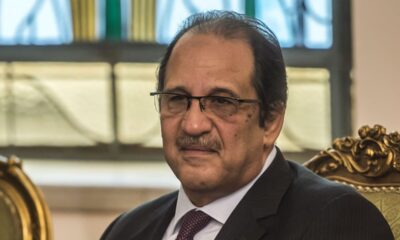

Hamas leader in talks for Gaza ceasefire with Egypt, Qatar
Ismail Haniyeh, the leader of Hamas, spoke with Abbas Kamel, the head of Egypt’s security services, and Mohammed bin Abdulrahman...
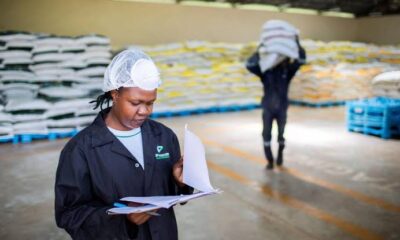

Kenya agri-tech startup iProcure placed under administration over unpaid debts
Kenyan agri-tech startup, iProcure, has been placed under administration due to its inability to clear up undisclosed debts. The advisory...
Trending
-
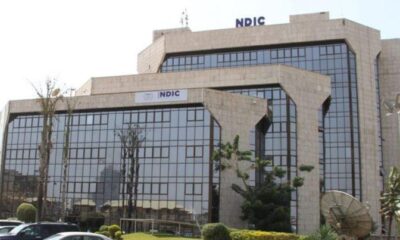
 VenturesNow1 day ago
VenturesNow1 day agoNigeria’s Insurance Corporation raises maximum deposit coverage from N500k to N5m
-

 Sports1 day ago
Sports1 day agoLiverpool legend Graham Souness wants ‘selfish’ Salah to leave club
-
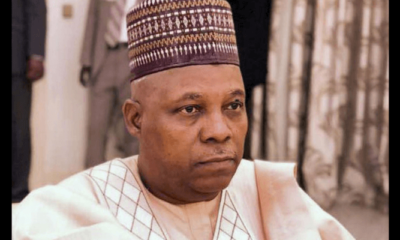
 Metro2 days ago
Metro2 days agoNigeria’s economy will witness positive changes after painful sacrifice— VP Shettima
-

 Culture1 day ago
Culture1 day agoEgypt unveils stamp to mark 100th anniversary of relationship with Brazil


